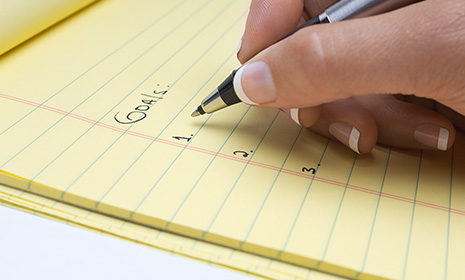An article written by psychologist Dr Jen Nash, who has Type 1 diabetes.

How has 2016 been for you?
Many of us feel that the end of the year is a time to make changes and set New Year’s resolutions - which we all know are often over by mid-January...
Managing a long term condition like diabetes, that requires a great deal of self-management, means that reflection and planning is a really important part of achieving the results that lead not just to health, but also to an all-important sense of wellness and inner wellbeing.

This article aims to support you to reflect on 2016 and look ahead to plan for any changes you feel are needed for 2017.
Your relationship with diabetes
As someone living with diabetes, you know that you don’t have to be defined by it, or any of the outcomes - whether it’s blood glucose readings, your weight, cholesterol or blood pressure, or the number of hypos and hypers you have.

However, these numerical values can feel negative when they are not as we would like.
But, measuring ourselves doesn’t have to be a negative thing if we can instead adjust our mindset and view it as feedback, as something may need to be changed.
Where to begin...
Look back over the year and reflect on:
- 3+ things you’re most pleased with when it comes to your health
- 3+ aspects you would have liked to be different
As well as the more obvious areas such as following dietary and exercise recommendations, smoking and alcohol use, look as broadly as you can to consider other factors. These could be aspects such as your attendance at health appointments, having your annual eye screening, learning about diabetes through personal research, and so on.

Next...
Look at the list of 3+ things you would have liked to be different. See them as clues that indicate that something could be changed in this area.
For example, high or low blood glucose readings may be evidence that your medication doses may need to be changed, timing of meals and snacks could be altered, weight gain could be a clue that your diet be improved.

Don’t forget that there are many influences and several of them can’t be controlled by us
Be fair to yourself
As you’re doing this reflection, take notice of your inner conversation. Self-judgement can be really common amongst people living with diabetes. It’s a medical condition, and the focus is often on the medical and numerical aspect of our efforts. However, it’s hard to untangle the personal effort we put in to living with the condition with the medical outcomes we often see.
Although diabetes management involves literal measurements (blood glucose, weight etc), aim to ensure you are also not judging yourself unfairly (against people without diabetes, against others HbA1C readings etc). Knowing

you are keeping going and making some effort each day will help you to untangle those feelings and ideas of self-worth when you consider your progress.
A change in approach
We often talk much more harshly to ourselves than we would ever talk to friends and family members. Diabetes requires us to develop a compassionate approach to ourselves.
I have found that asking myself, ‘What would I do or say to myself right now if I was being a good mum (or dad) to myself?’ really helps. Great parents are usually loving, but also kind enough to speak the truth when it needs to be told. Is it possible to develop the same style in your ‘inner talk’ to yourself?

If I find myself avoiding doing what I know I ‘should’, such as eating more than I need, I’ve come to realise that it’s often because the food (or avoidance of the blood glucose testing etc) is the best way I know how to take care of myself, in that moment.
It usually signals there’s an ‘inner need’ that needs to be met in that moment, and if I can find an alternative way to get that need met, the need to overeat becomes much less compelling. For example, if I’m nervous about something ahead, the desire to eat may be around, and whilst food may numb and distract this, the kinder thing may be to do what I can to prepare for the event, or talk to someone or get advice about it.
Asking myself the question, ‘why?’ about behaviour like this, is really key.
Evaluating your reflections
Having done your reflections for 2016, is there anything you need to change? If you’re happy with your progress this year, congratulations! Perhaps you’d like to share your news with someone or give yourself a well-deserved reward, symbolic or otherwise.
If you’re concerned you’re not making the progress or seeing the outcome that you’d like, congratulations for this insight too. Awareness of your situation is key to change, and the most important step in moving towards an outcome you’d prefer.
Looking at your reflections, is there one thing that immediately jumps out you can do differently? Starting with the smallest and easiest step is the one to begin with, as you’re more likely to achieve it and this often brings momentum to then tackle more challenging goals. This is also a great time to review whether it’s time to find out what support you can get from your diabetes healthcare team and make an appointment with the relevant professional.
A personal note
 Diabetes isn’t easy, and this time of year especially can bring that sharply into focus. If nothing else, this year I have striven to stay grateful that I have a condition that can be managed – when there are so many health concerns that can’t.
Diabetes isn’t easy, and this time of year especially can bring that sharply into focus. If nothing else, this year I have striven to stay grateful that I have a condition that can be managed – when there are so many health concerns that can’t.
Wherever you are on your diabetes journey, there’s always time to make changes, with a view to making your condition become more manageable when handled in the best way. Although New Year is a great time to make a
change, taking small and manageable steps toward your overall health goals throughout the months ahead will mean this time next year you’ll be celebrating what a great 2017 you were able to create!
